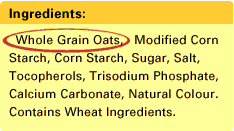By: Dianna Yanchis BSc (Nutrition) Candidate
Reviewed by Andrea Miller MHSc, RD
Whole Grain or Whole Wheat?
 Grain products, one of the four food groups, are foods that are made or derived from barley, cornmeal, oats, rice, wheat, or any other cereal grain. Grains are often the seeds of certain plants. The bran, the endosperm and the germ are the three main parts of the seed, or kernel. All three parts contain valuable nutrients that play an important role in the diet.
Grain products, one of the four food groups, are foods that are made or derived from barley, cornmeal, oats, rice, wheat, or any other cereal grain. Grains are often the seeds of certain plants. The bran, the endosperm and the germ are the three main parts of the seed, or kernel. All three parts contain valuable nutrients that play an important role in the diet.
Grains are divided into two subgroups, whole grains and refined grains. Whole grains are grains that have undergone the least amount of processing and contain all three parts of the kernel. Refined grains are whole grains that have had the germ and bran removed. As a result, there is a loss of fiber, B vitamins, iron and other vitamins and minerals. Whole wheat is usually a refined grain, therefore, missing several important nutrients.
What to Look For
 When looking for products that contain whole grains, look for the words “whole grain” on the label and in the ingredient list. Most foods containing whole grains will have the words “whole grain” followed by the name of the grain as one of the first ingredients. Rolled oats and brown rice are examples of whole grains, whereas white rice, white flour and cream of wheat are refined grains. Most refined grains are enriched. This means that certain B vitamins and iron that were originally lost when the germ and bran were removed are then added back after processing. However, fiber is not added back to enriched grains. When checking the ingredient list on refined grain products, make sure the word “enriched” is included in the grain name.
When looking for products that contain whole grains, look for the words “whole grain” on the label and in the ingredient list. Most foods containing whole grains will have the words “whole grain” followed by the name of the grain as one of the first ingredients. Rolled oats and brown rice are examples of whole grains, whereas white rice, white flour and cream of wheat are refined grains. Most refined grains are enriched. This means that certain B vitamins and iron that were originally lost when the germ and bran were removed are then added back after processing. However, fiber is not added back to enriched grains. When checking the ingredient list on refined grain products, make sure the word “enriched” is included in the grain name.
Why Choose Whole Grains?
Eating whole grains provides many health benefits, such as reducing the risk of some chronic diseases. Further, grains provide many nutrients, like B vitamins, fiber, iron, folate and several others that are vital for the health and maintenance of our bodies. Whole grains are a major source of dietary fiber that may help reduce blood cholesterol levels and may lower risk of heart disease, obesity, and type 2 diabetes. Fiber is also important in helping us feel full and for proper bowel function. Health Canada recognizes the importance whole grains play in a healthy diet and recommends that all Canadians should aim to get at least half of their grain servings as whole grains. It is with no doubt that whole grains should be included as part of a healthy diet.
Read more at:
https://www.eatrightontario.ca/en/Articles/Cooking-Food-Preparation/Cooking-with-Whole-Grains.aspx


